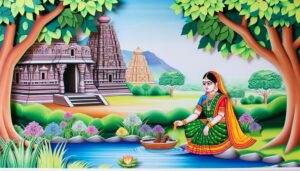Rekha Name Meaning in English
The name Rekha, rooted in ancient Sanskrit, translates to 'line' or 'mark.' It embodies physical boundaries and metaphorical distinctions. This name holds significant cultural importance in Indian traditions, where it symbolizes artistic grace and philosophical depth.
Historically, Rekha has been referenced in classical Indian texts and Vedic scriptures, signifying lines of destiny and demarcation. In contemporary culture, it is associated with the iconic Indian actress Rekha Ganesan, celebrated for her elegance and versatility in cinema.
The multifaceted implications of this name extend beyond its literal meaning, offering a rich tapestry of cultural and philosophical dimensions.

Key Takeaways
- Rekha means 'line' or 'mark' in Sanskrit.
- Symbolizes boundaries and distinctions, both physical and metaphorical.
- Represents concepts of destiny and human existence.
- Deeply rooted in Indian culture, art, and philosophy.
- Often used in classical Indian literature and Vedic astrology.
Origin of the Name
The name Rekha, derived from the Sanskrit language, traces its origins to ancient Indian culture, where it embodies the concept of a 'line' or 'mark' signifying boundaries and distinctions.
This nomenclature found extensive usage in Vedic and classical texts, encapsulating both tangible and metaphorical demarcations. Within Hindu philosophy, Rekha symbolizes the lines of fate inscribed on one's palm, intertwining with concepts of destiny and human existence.
The term has evolved to encompass a broader cultural significance, appearing in art, literature, and religious rituals. The multifaceted nature of Rekha highlights its profound role in demarcating physical spaces and abstract ideas, reflecting the rich tapestry of Indian heritage and linguistic tradition.
This origin underscores its enduring relevance in contemporary contexts.
Literal Translation
In its most literal translation, Rekha frequently denotes a 'line' or 'mark,' encapsulating both physical boundaries and metaphorical distinctions. This dual connotation emerges from its roots in Sanskrit, where 'rekha' signifies a drawn line or demarcation.
When examined linguistically, it presents a nuanced understanding of separation and connection, whether referring to the physical act of drawing a boundary or to abstract concepts like fate and destiny. This term, entrenched in various Indian languages, extends beyond mere semantics to convey the profound idea of defining limits and creating connections.
Thus, the literal meaning of Rekha provides a foundation for exploring its broader implications, revealing layers of interpretation that resonate in diverse contexts.
Cultural Significance
Building on its literal interpretation, Rekha's cultural significance is deeply embedded in the rich tapestry of Indian traditions, where it symbolizes various philosophical, artistic, and social dimensions.
In classical Indian art, the term Rekha often refers to the graceful lines that define a painting or sculpture, imbuing it with life and character.
Philosophically, it denotes the lines of fate, holding profound implications in astrology and palmistry, where Rekha represents an individual's destiny.
Socially, the name Rekha is celebrated in Indian literature and cinema, epitomized by iconic figures who embody grace and resilience.
Therefore, the name Rekha transcends its literal meaning, weaving into the cultural and spiritual fabric of India, resonating deeply with notions of destiny, artistry, and cultural identity.
Historical Context
Tracing its roots back through centuries, the name Rekha holds a venerable position in historical texts and ancient scripts, reflecting its enduring presence and significance in Indian heritage. Derived from Sanskrit, Rekha translates to 'line' or 'mark,' symbolizing boundaries and directions, often laden with philosophical undertones. In Indian culture, names often carry deep meanings that reflect the values and beliefs of the society. In this regard, the reema name meaning holds great importance, signifying the concept of beauty and grace. The name Rekha, with its rich cultural significance and timeless relevance, continues to be a source of inspiration and pride for many individuals carrying it.
Historical references to Rekha can be found in various domains:
- Literature: Ancient epics and classical poetry frequently allude to Rekha, intertwining it with themes of destiny and demarcation.
- Art and Architecture: The term Rekha is used to describe specific styles of temple architecture, such as the Rekha Deul of Odisha.
- Astrology: In Vedic astrology, Rekha signifies important lines on the palm, believed to hold insights into one's fate and life path.
These elements underscore the name's deep historical resonance.
Famous Personalities
Renowned for her immense contributions to Indian cinema, Rekha Ganesan, popularly known as Rekha, exemplifies the cultural richness and enduring legacy associated with the name.
Her career, spanning over five decades, showcases her versatility and resilience. Rekha's roles often embody complex, multifaceted characters, which have garnered critical acclaim and numerous awards, including the prestigious National Film Award for Best Actress. Her ability to transform herself for each role demonstrates an unparalleled dedication to her craft.
Beyond her artistic achievements, Rekha's influence extends to fashion and public life, where she is celebrated as an icon of elegance and strength. Her enduring presence in the industry highlights the timeless appeal and significant impact of the name Rekha.
Symbolism and Traits
In analyzing the name Rekha, one uncovers a rich tapestry of symbolism and traits that reflect both cultural heritage and individual identity. The name, originating from Sanskrit, translates to 'line' or 'limit,' signifying boundaries and delineation. Such connotations evoke a sense of structure, order, and precision. Individuals named Rekha often exhibit a balance between creativity and discipline, embodying an inherent harmony.
- Cultural Significance: As a name deeply rooted in Indian culture, Rekha conveys traditional values and timeless aesthetics.
- Personality Traits: Common traits include resilience, attention to detail, and an innate artistic flair.
- Symbolic Interpretation: The name suggests a journey marked by clear paths and definitive goals, reflecting a life of purpose and clarity.
This analysis underscores the profound resonance of the name Rekha.
Modern-Day Usage
The contemporary significance of the name Rekha reveals its enduring appeal and adaptability within various cultural and social contexts. In the modern era, Rekha continues to be a favored choice among parents, symbolizing tradition while embracing contemporary trends.
Its simplicity and elegance make it a versatile name that transcends generational boundaries. In India, Rekha remains a popular name, often associated with the iconic actress Rekha, whose legacy enhances its allure. Beyond India, the name has found resonance in global communities, reflecting the cultural exchange facilitated by the diaspora.
Rekha's phonetic ease and meaningful connotations guarantee its persistent use, embodying both historical richness and modern dynamism. Therefore, the name Rekha exemplifies a harmonious blend of timeless tradition and present-day relevance.
Conclusion
To sum up, the name Rekha, rich in history and cultural significance, transcends mere nomenclature to embody a tapestry of traits and symbolism.
Despite objections that names are devoid of inherent meaning, Rekha encapsulates a profound blend of beauty, depth, and historical resonance.
This multifaceted significance guarantees that Rekha remains relevant in modern contexts, illustrating how names can serve as vessels for cultural heritage and personal identity, seamlessly bridging the past and present.






